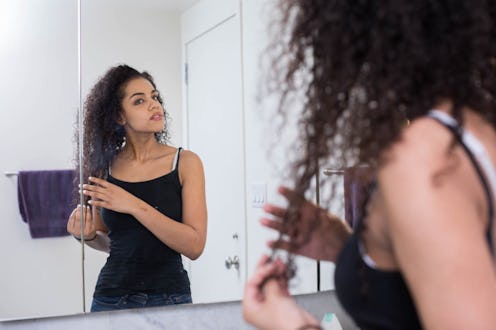Fashion
The Problem With Dove's Redefining Beauty Campaign

For the past several years, Dove soap's marketing campaign has focused on "redefining beauty." And it's not just Dove. The whole pop self-esteem industry is built on convincing women they're "beautiful just the way they are." On the surface, it's a worthy goal — as women, we're constantly bombarded with photos of airbrushed-into-alienhood models and messages that we'll never measure up. Saying "I'm good enough as is" can be a radical move. It's the bringing beauty into everything where I object.
So does writer Charlotte Alter, in a Time essay that had me wanting to tweet out every other line. Alter's piece is a response to the new, sure-to-go-viral video from Dove titled "Selfie," which she describes as the "heartwarming tale of a bunch of normal-looking girls who have absolutely no discernible interests in anything except how they look. They all thought they were ugly until Dove told them they were beautiful, and then the world was illuminated with their beaming smiles, because they are beautiful, and feeling beautiful makes you happy, according to Dove."
I kind of went soft on "Selfie" when I wrote about it earlier this week, because people seem to like these sorts of videos (last year's Dove video, "Sketches," was the most watched online ad of all time) and I hate to always be the curmudgeon sitting here all "Get off my digital lawn, Dove!" I even found myself questioning what was wrong with me — why can't I feel inspired or empowered by these videos, too? It's not the selling-products-in-the-guise-of-feminism that bothers me; Dove does this brilliantly (way better than Pantene) and I don't begrudge brilliance. I just can't get past the way these ads hold up "beauty" as the ultimate female goal.
“'Redefining beauty' is just another way to keep talking about beauty, which is what companies want but is the last thing girls need."
Narrow beauty standards suck, and it seems evident that they're only narrowing more, at least in pop culture. Real men and women are attracted to a vastly wider swath of looks and sizes than media representations of hotness would let on. But though beauty is certainly culturally defined, its existence isn't some myth made up by Vogue and Cover Girl and Adobe. It's subjective, but not imaginary. No matter how hard we try to "redefine beauty," certain things — facial symmetry, features that are in proportion to one another, etc. — are always going to read as "more beautiful." Certain people are always going to hew closer to aesthetic ideals than others.
We can sloganeer all we want, but ultimately it comes off empty. If everyone was beautiful, the word and concept would be totally meaningless. The point is that it doesn't matter, or shouldn't. Beauty doesn't guarantee happiness. Beauty isn't a prerequisite for success. Feeling beautiful isn't the be-all end-all of confidence, contentedness, or power.
"Making girls suddenly feel beautiful is all well and good for the purposes of selling soap and moisturizers, but it’s not real progress," as Alter writes. "Real progress would be if that conversation in the gym were about climate change, not hair ... “’Redefining beauty’ is just another way to keep talking about beauty, which is what companies want but is the last thing girls need.”
There is a difference between feeling beautiful and feeling good about oneself, though the Dove ad (and so many like it) conflate the two. Instead of teaching girls that they, too, can be beautiful if only they learn to take better selfies, or look real hard at themselves, or focus on their few features that do fit into standard beauty molds, why not teach them that beauty is overvalued? That's it's fleeting? That it's only one part of what makes a person desirable? That they can derive equal fulfillment and self-satisfaction from intellectual, athletic, artistic achievement? That beauty isn't the highest thing to aspire to?
Image: Ashley Batz/Bustle